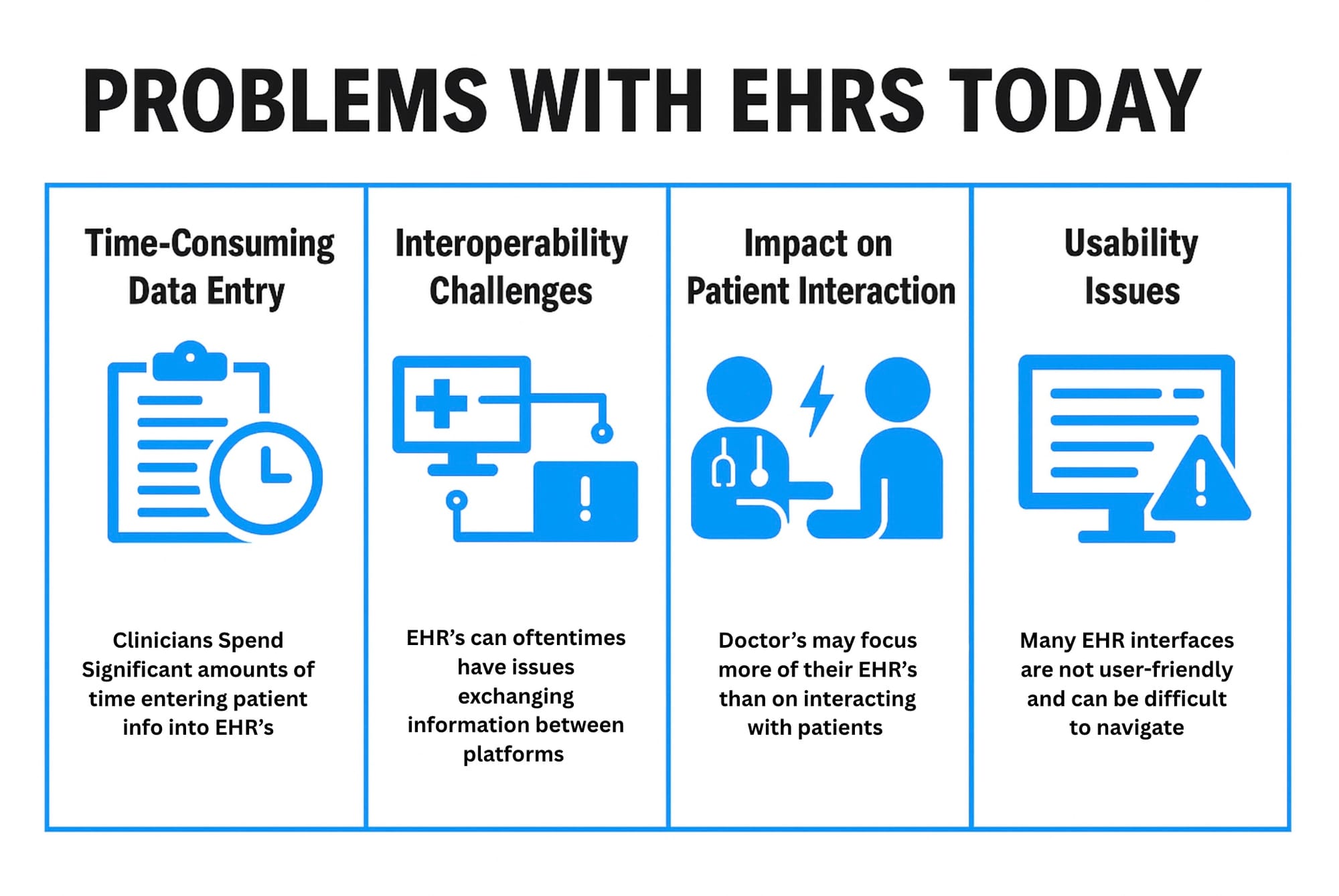How Adding AI Improves Clinical Workflows and Patient Care

Electronic Health Records are now a core part of modern healthcare, used by more than 90 percent of hospitals and nearly 90 percent of private practice physicians in the United States, as of 2021. These systems make it easier to store and access patient information, improving the organization of medical records and daily workflows.
However, EHRs alone are not designed to manage the full complexity of clinical practice today. Hospitals and clinics are beginning to recognize that while EHRs are essential, they are not complete solutions on their own. As a result, more healthcare organizations are turning to advanced tools powered by artificial intelligence to extend the capabilities of their existing EHR systems.
By integrating AI-driven solutions, healthcare providers can enhance documentation, decision support, and care coordination , allowing clinicians to work more effectively and spend more time focusing on patient care.
Problems with EHRs Today

Despite their widespread adoption, EHR systems continue to present significant challenges. Many physicians report that they spend more time managing the EHR than interacting with their patients. One study found that clinicians spent 1-2 hours per night at home. This imbalance reduces time with patients and contributes to increased stress and fatigue among clinicians.
Another common issue is that EHRs often store data across multiple locations, making it difficult for providers to quickly access the information they need. Although most systems offer built-in decision support tools, these often generate excessive alerts, leading to alert fatigue and reduced effectiveness.
These limitations reveal why traditional EHR systems are no longer enough on their own to support the demands of modern clinical practice.
AI’s Role in Improving Healthcare
Artificial intelligence is opening new possibilities in healthcare by supporting clinical decisions and improving the way information is used. AI technologies can help predict patient needs, identify health risks, and assist providers in delivering more timely and personalized care.
Natural Language Processing is one example. It can extract meaningful insights from clinical notes, making unstructured data easier to interpret and use. Machine learning models can analyze large volumes of data to detect patterns, such as early warning signs for serious conditions like sepsis. Some studies have shown that AI systems can alert clinicians early enough to take preventive action.
AI also plays a role in real-time decision-making by evaluating patient data, including vital signs and medical history, and offering tailored recommendations. In addition, it automates routine administrative tasks such as medical coding and scheduling, freeing up time for both clinical and support staff.
AI in Practice
Artificial intelligence is already making a measurable impact in healthcare. One of its most effective uses is in clinical documentation. AI tools can listen to conversations between doctors and patients, summarize the exchange, and generate detailed notes. This reduces the amount of paperwork providers must complete after hours.
AI is also proving valuable in predictive analytics. Machine learning models can identify patients at risk for serious complications or repeated hospital visits. Some health systems have integrated AI to flag high-risk individuals, such as patients who may develop sepsis, giving doctors more time to intervene.
Administrative tasks are also becoming more efficient with AI. Processes like prior authorizations and medical coding, once entirely manual, can now be handled more accurately and quickly. By extracting and processing key information, AI reduces errors and denials while supporting more precise billing and improved revenue management.
Addressing the Issues of Data Privacy, Bias, and Trust
While AI brings significant potential to healthcare, it also raises important concerns that must be addressed to ensure responsible use. One of the most critical is data privacy. AI vendors must comply with HIPAA regulations and implement strong safeguards such as encryption, access controls, and audit logs to protect sensitive patient information.
Another key issue is bias in AI algorithms. When systems are trained on unbalanced or incomplete data, they can unintentionally reinforce health disparities. For example, a study showed that one AI tool underestimated the severity of illness in Black patients, resulting in unequal care. To prevent this, healthcare organizations must use diverse datasets, regularly monitor AI outputs, and apply fairness strategies throughout development and deployment.
Trust is also essential. Clinicians need to understand how AI arrives at its recommendations. Tools that provide clear, interpretable explanations are more likely to be trusted and adopted in real clinical settings. Furthermore, tools that generate citations to source material can improve trust.
EHR Add-Ons Enhance Functionality Without the Need for a Full System Overhaul
For hospitals and clinics already using EHR systems, AI-powered add-ons offer a practical way to expand functionality without replacing existing infrastructure. These tools support tasks such as automated documentation, predictive analytics, intelligent order sets, and risk assessment. By reducing cognitive load, they help clinicians make more efficient and informed decisions.
Rather than requiring a complete system upgrade, these add-ons target specific workflow challenges. Most are designed to integrate seamlessly using standard APIs and FHIR protocols, making them compatible with a wide range of EHR platforms. This approach allows healthcare organizations to improve performance and care quality while maintaining stability within their current systems.
The Future of AI in Healthcare
The role of artificial intelligence in healthcare is expected to expand significantly in the years ahead. Emerging AI systems are being designed to interpret a wide range of data types, including lab results, imaging, genomics, audio, and video. This evolution will help improve diagnosis, especially for complex or rare conditions and mental health disorders.
In the near future, AI technologies that use voice, sensors, and visual input may become part of routine hospital and clinic operations. These tools could provide real-time monitoring and insights without adding extra work for clinical staff. As these innovations continue to develop, AI is positioned to become an essential and trusted part of everyday healthcare.
The Economic Impact of AI
Integrating AI into EHR systems often requires a substantial upfront investment. Expenses may include purchasing new technology, training staff, and making adjustments to clinical workflows. However, these initial costs can be balanced by long-term financial gains.
AI increases efficiency by automating repetitive tasks, minimizing errors, and helping healthcare organizations use resources more effectively. For instance, predictive analytics can identify early signs of disease, allowing for timely interventions and reducing the need for costly treatments later on.
According to a report by the Paragon Institute of Health, AI has the potential to significantly lower healthcare spending by improving operational performance and enhancing patient outcomes.
AI’s Growing Influence in Health
As healthcare continues to focus more on care quality and outcomes, artificial intelligence is playing an increasingly important role in population health management. AI can analyze large volumes of clinical and social data to identify patterns, uncover care gaps, and flag patients who may be at risk. These insights enable healthcare providers to intervene early and prevent conditions from worsening.
For instance, AI can scan patient panels to identify individuals who are overdue for preventive screenings or showing early signs of complications, such as rising blood sugar levels. This allows care teams to make timely adjustments to treatment plans, including medication changes when necessary. By providing real-time updates and alerts, AI helps clinicians prioritize patients who need immediate attention.
This is not a future concept. Many health systems are already using AI in combination with EHRs to better manage chronic conditions, reduce hospital readmissions, and ensure timely care delivery. In some cases, AI also identifies social determinants of health and connects patients with community-based services that address broader care needs.
Incorporating AI into healthcare systems enhances care coordination and patient engagement without increasing the workload for clinical staff. It supports physicians and nurses in delivering more proactive, personalized care, leading to better overall health outcomes.
Conclusion
Electronic Health Records have become a central part of modern healthcare, but they are not enough on their own. To fully realize the value of these systems, healthcare organizations are turning to AI-powered tools that extend the capabilities of EHR platforms and ease the administrative burden on clinical teams.
AI solutions support everything from automated documentation to improved coding accuracy and real-time risk scoring. These tools help providers focus more on patient care, reduce operational strain, and enhance the overall efficiency of healthcare delivery.
When integrated thoughtfully into existing workflows, AI enhances performance, supports regulatory compliance, and prepares organizations for the future of healthcare. Choosing the right technology means finding solutions that align with clinical needs, protect patient data, and deliver clear, measurable benefits.
For organizations looking to improve documentation and streamline EHR workflows, DocAssistant offers a complete solution. It integrates smoothly with existing systems and provides a reliable, intelligent platform for efficient and accurate clinical documentation.
Frequently Asked Questions on AI Integration with EHRs
- Can AI work with my current EHR system?
- Yes, most AI tools are designed to integrate with the EHR systems already in place. It is important to choose a vendor with experience in your specific platform to ensure a smooth connection and uninterrupted workflows.
- Will I need more IT staff to manage AI tools?
- Adding AI features may require some setup and ongoing support, but many vendors offer assistance to reduce the burden on your internal team. Reviewing your current IT resources and understanding the vendor’s support options will help you determine if additional staffing is needed.
- Is using AI safe for patient care?
- When implemented properly, AI tools can support patient safety by minimizing errors and improving clinical accuracy. The key is to use trusted, compliant solutions that are transparent and tested to meet healthcare standards.
About the Author
Nathan Murray, M.D. Emergency Medicine - Founder of DocAssistant
Dr. Nathan Murray is an Emergency Medicine trained physician and the founder of DocAssistant. With years of frontline clinical experience, Dr. Murray is passionate about using AI to streamline administrative tasks and enhance clinical decision making.


